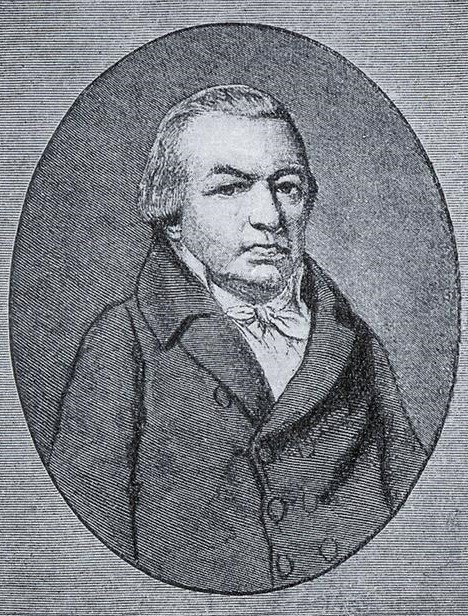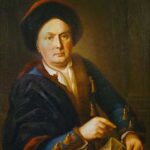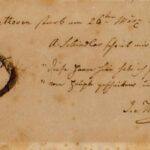Johann van Beethoven, father of the legendary composer Ludwig van Beethoven, played a significant role in shaping the musical genius we know today. Despite facing personal and professional challenges throughout his life, Johann’s influence on Ludwig’s early musical education laid the foundation for his later success. This is a short biography of Johann van Beethoven, focusing on his relationship with his son, Ludwig.
Ludwig van Beethoven’s father, Johann, was a German singer, musician and music teacher. He played keyboard, violin and zither. Johann married Maria Magdalena Keverich in 1767, who had become widowed at a young age. Johann was Ludwig’s first music and keyboard teacher, and his manager and promoter in the years to follow. He was employed by the court in Bonn as a choir member. As a teacher he was harsh and impatient, and as alcohol began to tighten its destructive grip, Johann was increasingly unable to perform his duties as head of the family. Ludwig eventually took over and supported his younger brothers, towards whom he felt a strong sense of duty.
Johann van Beethoven’s character
Johann and his wife, Maria were well-liked in Bonn, by musicians and music enthusiasts alike. They were known to be excellent hosts, their hospitality memorable, welcoming their guests for parties in their elegant and spacious flat.
The townspeople would see Johann dashing from one appointment to another, with the air of being perpetually late for his engagements. He wore his hair in a pigtail, he had a broad forehead, round nose and an altogether pleasant face.
Johann van Beethoven’s career
Johann had sung in the choir at the court from a young age, but only began to earn money in this way a decade later. He sang tenor, his voice suited to singing as a member of the choir, but a mediocre talent none the less. To augment his salary from the court, he taught children voice and keyboard. Having also learnt the family trade in wine (and enjoyed sampling the products), a sad and familiar tale was to follow: Johann would later lose control over his drinking habit, rendering him incapable of supporting his family.
His father, Ludwig the Elder, had been Kapellmeister (choirmaster and head of music) at the court of prince-elector and Archbishop of Cologne – Clemens August of Bavaria – in Bonn. After Ludwig the Elder died in 1773, Johann aspired to fill the post of Kapellmeister. He did not succeed in achieving his goal. Johann was said not to be suited to the role in either intelligence, talent or character.
Johann, Ludwig’s teacher and promoter
Johann began Ludwig’s musical instruction from when his son was five years old. Ludwig stood on a stool so as to reach the keys on the clavichord or harpsichord; he would only play the pianoforte in years to come in Vienna, a hub of piano development. His father intended for him to become a court musician, teaching him to play violin and viola too. His extraordinary talent soon became apparent, however, thus, Johann widened his ambitions for his son.
Johann was an impatient and at times abusive teacher to Ludwig. Ludwig was reportedly shouted at and beaten. This harsh treatment during his first years of learning the keyboard contributed to a mounting resentment he felt towards his father in later years. Ludwig was close with his mother, and respected his grandfather, however, Johann’s role in his life was one of promoter and manager, not father.
Johann realized his son’s musical talent early on, and stood before the decision of finding him a teacher that could help him progress in his career. One of these teachers would wake Ludwig in the night for lessons on return from the pub with Johann, or as and when his mood dictated. Johann’s own career was not progressing as he had planned, and it is likely that this also led him to throw his full force behind promoting his son as soloist.
Ludwig was keen to improvise and compose his own pieces already around the age of 10. His father discouraged him at first, but Ludwig was already beginning to depart from his father’s vision for his career, and step into his own as a musician. Already apparent at this young age, Ludwig had an instinctive understanding of harmony. He soon produced his first composition, the Dressler Variations at age 12.
Misrepresentation of Ludwig’s age
In 1763, the Mozart family had visited Bonn, an event Johann and his father, Ludwig the Elder were unlikely to have missed. Mozart was six years old when he became known as a child prodigy, and it is perhaps for this reason that in 1778 on March 26th, Johann advertised the seven-year-old Ludwig as being just six, on a flier for a concert at a hall in Cologne. This particular event did not yield the result Johann was hoping to achieve, therefore Ludwig continued to perform in the great houses in Bonn, their own home and at the court.
Johann also took his son with him in search of musical people of influence and money, these travels taking them town to town in the Rhineland. During these journeys Ludwig’s love of the natural environment was awakened within.
In print, Ludwig had now been labelled a genius. A 10-year-old genius, at the publication of the Dressler Variations! Ludwig was now aware of the discrepancy between his actual and reported age.
Schemes and opportunism
Johann was known to cook up the odd economic initiative from time to time, with varying degrees of success. He did not leave opportunities for financial gain unexploited. For instance, when Maria married Johann, he acquired a large sum of money from her mother, which is understood to have been taken, not given as a dowry. And when his father passed away, he chased down those individuals who had been in business with Ludwig the Elder and owed him money. As Johann’s drinking increased, unsurprisingly, he continued to lose his grip as provider of the family. In need of cash fast, during one such scheme in 1787, he sued the late Count Belderbusch’s estate, aiming to reclaim a collection of valuables he had once gifted the minister as a bribe to become Kapellmeister. He got caught for forging a lawyer’s signature; his plan was exposed and he was humiliated as a result. In the same year, his wife Maria died from tuberculosis, at 40 years old.
Succumbing to the bottle
As a child, Johann had witnessed his mother become captive of her alcohol addiction, endured his parents’ arguments and eventually his mother’s removal from the family to a cloister in Cologne, where she remained and died twenty years later.
After the passing of his wife, Johann no longer had the strength or perhaps even the will to reduce his drinking. His children would appear at the pub, begging him to return home. Other nights Johann would not even make it home, collapsing in the town, leaving Ludwig to plead with the police to stop him from being arrested.
Ludwig, head of the family
His vivacity that once drew him many friends was waning fast, his ability to support his family finally lost to him. Still a teenager, in 1879, Ludwig requested the Elector of Bonn to allow his father to retire, asking for his pension to be paid to him, as eldest son. It was agreed that Ludwig would give his father half of this sum, and with the other half, he would augment his salary to help support his brothers. A clause was included in the agreement, that Johann could be exiled from Bonn in the event he was not cooperative.
|Related: When Beethoven exiled his own father
Johann implored his son to allow him to collect his pension and hand Ludwig half of each payment, to help cope with the shame of his situation. Ludwig agreed, and Johann kept his word.
Ludwig felt no love for his father. He wanted to be far from his reach. As his brothers became able to support themselves, he was free to depart for Vienna. In correspondence with one of his brothers, he refused to write his father’s full name, instead referring to him as ‘J’. It can be argued that his father’s abusive nature contributed to Ludwig’s lifelong rebellious approach to authority.
Johann would cry praise for his talented son to whoever would listen, his son’s success and the bottle his only comforts.
In 1792, Johann died around the age of 53, most likely of heart failure. Ludwig did not return from Vienna for the funeral.
Upon hearing of Johann’s death, the elector of Bonn, Max Franz wrote in a note to Court Marshal von Schall mockingly, that the town’s liquor taxes will take a hit following Johann van Beethoven’s passing.
A.K.









